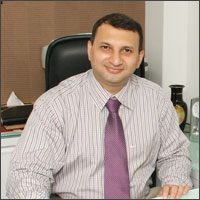By Ziaulla Nomani, Muallim Magazine,
Heart disease, which was earlier associated with older men, is now becoming common among youths.
According to a World Health Organisation (WHO) report, four people die of heart attack every minute in India and the age group is mainly between 30-50. Based on figures released by WHO, 60% of the world’s cardio-vascular patients are expected to be in India by 2016.
In the wake of this alarming report, Ziaulla Nomani spoke with with Dr. Zainulabedin Hamdulay, a Mumbai based reputed Cardiac surgeon and the to establish a state-of-art Cardiac Rehab centre in Mumbai on individual basis, to know about the symptoms and precaution of this deadly disease. Dr. Zainulabedin Hamdulay is the first to start ESMR treatment in Mumbai. He is a Consultant Cardiothoracic Surgeon to Lilavati Hospital, Wockhardt Hospital, Breach Candy Hospital and others.

Excerpts:
What’s your opinion about the heart ailments?
Dr. Hamdulay : Heart ailments are causing concern world-wide, but Indians are at more risk of this deadly disease because of their sluggish lifestyle. According to a recent report by the Indian Medical Association, at least 10 per cent of people over the age of 30 in urban areas and 5 per cent in rural areas have blocked arteries, which can lead to serious heart problems. Indians have smaller calibrated arteries that makes us three times more vulnerable to heart attacks compared to other part of the world.
Symptoms of Heart Diseases?
Dr.Hamdulay: The two major warning signs of heart disease are angina (chest pain) and shortness of breath. Angina involves feelings of heaviness, pain, squeezing or burning in the chest. These sensations may also travel into the left arm, neck or jaw. Angina is oftentimes mistaken for indigestion and gas and is therefore frequently missed by doctors on the first diagnosis.
What precaution needed to be taken to keep the heart at its best?
Dr Hamdulay: Eight steps that you can take to have a healthy heart and lower your chances of developing cardiovascular disease:
Know your risk factors. If you have a parent or other close family member with cardiovascular disease, you are at a higher risk. Odds of developing this disease also increase as we age. People who are diabetic have an elevated risk of developing cardiovascular disease because chronic high blood sugar is associated with the narrowing of the arteries.
Make healthy food choices. Limit your intake of greasy, fried, or fatty foods and red meats. Fill your diet instead with fresh fruits and vegetables, lean meats such as poultry and seafood, and fiber-rich foods such as whole-grain Oatmeal and whole-grain breads.
If you’re overweight, get to a healthy weight and maintain it. Overweight invites cardiovascular disease. A maintained weight can help lower your likelihood of developing cardiovascular disease. Work with your physician or dietician to find a healthy eating plan that will work for you.
Establish and follow a regular exercise program. It is recommended to reduce the risk of chronic disease to engage in at least 30 minutes of moderate intensity activity most days of the week. Consult with your family physician to see what forms of activity are appropriate for your age and current physical condition.
Have your cholesterol and blood pressure checked regularly. Have your family physician check your cholesterol and blood pressure at least once a year. If either of these sets of numbers is high, your chances of developing cardiovascular disease greatly increase.
If you smoke, you should quit. Smoking is one of the leading causes of cardiovascular diseases. People can cut their risk of developing cardiovascular disease in half within one year of quitting smoking.
Get a handle on your stress. Stress may help contribute to heart disease. Try practicing meditation or yoga as a way to combat stress. Take a few minutes out of each day and do something you enjoy.
Don’t ignore possible warning signs. That burning sensation in your chest may simply be the result of heartburn, but it could also be a warning sign of the presence of cardiovascular disease. Other symptoms may include a sense of tightness emanating from the breastbone and into the neck, jaw and arm or a shortness of breath. If you have any of these symptoms, don’t casually dismiss them. Let your physician determine what is causing them and follow his advice.
( Dr. Zainulabedin Hamdulay is the first to start ESMR treatment in Mumbai. He is a Consultant Cardiothoracic Surgeon to Lilavati Hospital, Wockhardt Hospital, Breach Candy Hospital and others.)

